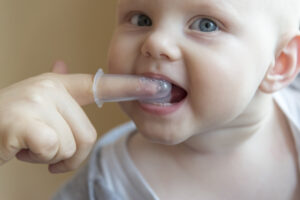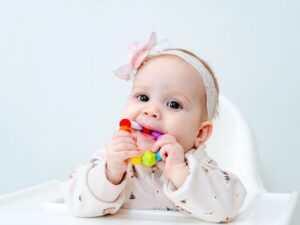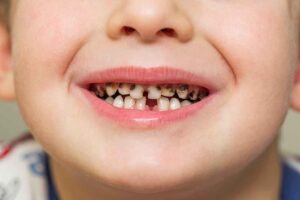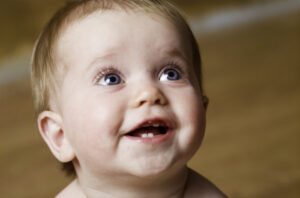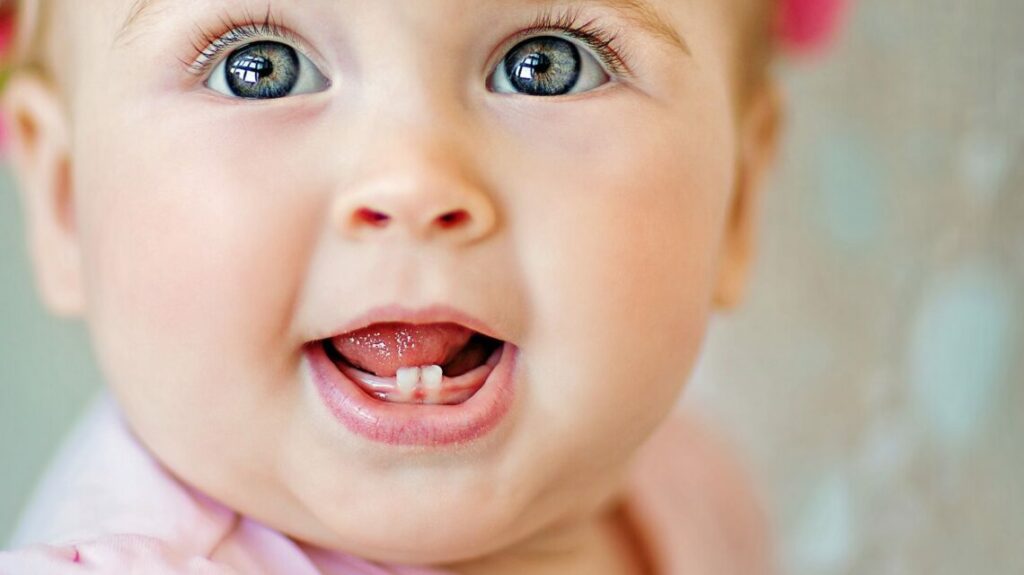
Baby Teeth: Something to Worry About?
It is easy for people to think decay in baby teeth isn’t important as they will be replaced by adult teeth. But baby teeth do matter.
Decayed baby teeth can cause pain, infection and problems with eating, sleeping and going to school. Some baby teeth stay in the mouth until children are 12 or 13, which is too long to be suffering with toothache and soreness.
The Academy of Paediatric Dentistry recommends that children make their first visit to the dentist before their first birthday or six months after they get their first tooth.
Prevention and education are key to a lifetime of healthy smiles. You can make an appointment for your child under two years of age. We at ‘Smile Delhi’ check your baby’s teeth for decay and make sure they are erupting properly. We also discuss proper oral care, diet and habits that can influence your child’s dental health and well-being.
This first visit is an excellent opportunity to introduce your child to dentistry in a fun and positive way.
Why are Baby Teeth Important?
Baby teeth, also called primary teeth/ milk teeth, in your child’s mouth give way to the eruption of permanent teeth. Although baby teeth are great for sweet smiles and cuteness, they have other functions.
- They help with proper chewing and eating. During the chewing process, food is broken down into small pieces that are easily digested.
- They are necessary for your child to learn to speak. When primary teeth are healthy, well-spaced and aligned, your child is better able to form words and speak clearly.
- They serve as space holders for permanent teeth and help guide them onto place as they start coming in.
We all hope for good health and a lifetime of smiles for our children. Here are some important facts and tips to keep those baby teeth healthy and prevent harmful dental problems for years to come.
Signs of Teething
Every baby experience teething differently. Some babies have no symptoms, while others seem to go through a lot of pain.
Some common teething symptoms your baby might experience include:
- Drooling
- Irritability
- Swelling or Redness of Gums
- Ear Rubbing
- Facial Rash
- Mild Temperature
- Sucking or Biting
- Diarrhoea
Tips for Easing Your Baby’s Discomfort While Teething
Once you know that your baby is teething, you can opt for various ways to ease your baby’s discomfort
Helpful tips you can try to relieve the pain include:
Tip #1 – Massage the Gums – The swelling and pain that comes with teething can often be soothed by massaging the gums. Many babies start biting down on the sides of a crib or playpen when teething because they like the pressure. Use a clean finger to gently massage the gums to help reduce their pain.
Tip #2 – Teething Toys – Many little ones love chewing on something hard because it adds pressure, and it can even speed up the teething process. Teething toys made of toxin-free plastic, rubber, or silicon are all great choices. Experiment a bit to see what your child likes the most, and make sure you keep teething toys clean.
Tip #3 – Use Something Cold – A cool washcloth or even a frozen wash cloth can feel wonderful on your baby’s irritated gums. Plush teething toys that are chilled also make great options. You can dip them in a bit of breast milk and freeze them or put them in the refrigerator as well.
Tip #4 – Offer Chilled Food – Many babies don’t want to eat much while they’re teething, and since cold feels good on swollen gums, chilled food may help. Be sure to choose only healthy foods, such as soft frozen fruits if your baby is already eating solid food.
Tip #5 – Skip Teething Medications with Lidocaine and Benzocaine – Some of the over-the-counter teething medications that contain lidocaine or benzocaine can actually prove harmful to your baby, and they’re not recommended. You should also avoid homeopathic teething tablets.
If your baby exhibits these symptoms and they don’t go away or seem to worsen, please contact your paediatrician. There might be something else going on.
Brushing Baby Teeth
Before your baby’s first tooth becomes visible in the mouth, wipe their mouth every day with a soft, moist washcloth. As soon as teeth become visible in the mouth, brush them twice a day with a small soft bristle toothbrush that contains a rice sized smear of fluoride containing toothpaste. Encourage your baby to spit out the toothpaste.
Baby Teeth and Cavities
Just like permanent teeth, baby teeth can get cavities. ‘Baby Bottle Tooth Decay’ is a term used to describe the decay that develops when baby teeth have frequent and prolong contact with too much sugar. It can occur when babies are put to bed with a bottle, when a bottle is used as a pacifier or if a baby uses a bottle or sippy cup for extended periods of time. Bacteria already in the mouth feed on the sugar, multiply and produce acid as a waste product. This acid attacks the teeth and tooth enamel, resulting in tooth decay. To prevent baby bottle tooth decay, take the bottle away while your child is sleeping.
Why should you be Concerned with Baby Bottle Tooth Decay?
They’re just baby teeth and they lose them anyway, right? True, babies do lose their baby teeth, but infant cavities can be a serious problem. Children need their teeth to chew, speak, and smile till they grow in adults and have their permanent teeth. Baby teeth hold the space for permanent teeth. If your child loses a baby tooth too early, the adjacent teeth are more likely to tilt or drift into the empty space and create limited space in the jaw for the permanent tooth to erupt. If left untreated, the permanent tooth can come in crowded or be blocked from erupting.
If baby teeth don’t develop properly, your baby will have trouble while eating and also have speech problems.
The first signs of Baby Bottle Tooth Decay are white spots on the smooth surfaces of the front teeth. If untreated, these white spots will quickly develop into tooth decay. Teeth that already have decay may appear brown or black. It most often occurs in the upper front teeth, but other teeth may also be affected.
What are Some Ways to Prevent Baby Bottle Tooth Decay?
- Try not to share saliva with your baby by sharing feeding spoons or licking pacifiers.
- Place only formula milk or breastmilk in bottles.
- Avoid filling bottles with sugar water, juice or soft drinks.
- If your child uses a pacifier, provide one that is clean, don’t dip it in sugar or honey.
- Break away from the habit/ convenience of putting the child to sleep with a bottle of juice or milk. The sugar in the liquid will remain on your infant’s teeth for hours resulting in cavities.
- Don’t let your child walk around with a bottle of juice or milk.
- Wipe the baby’s gums with a clean gauze pad or washcloth after each feeding.
- Begin brushing your child’s teeth as soon as they grow in. Brush gently with a child-size toothbrush and a small amount of fluoride toothpaste until the age of 3.
- Floss your child’s teeth after all of them have grown in.
- Limit the amount of juice/ sugary drinks you give your child.
- Encourage healthy food habits, and limit sweets in general.
- Schedule regular dental visits after your child’s first birthday.
It’s never too late to break bad habits. If your child currently drinks sweetened liquids from the bottle or sleeps with a bottle, you can work to break the habit now. Begin by gradually diluting the bottle with water over 2 to 3 weeks until you give only water.
Other ways to prevent cavities are:
- Avoid giving your baby sticky foods and unhealthy snacks like candy, soda or juice in between meals. Instead, give your baby healthy snacks like cheese, yogurt or fruit.
- Limit the amount of juice you give your child. No more than 6 ounces per day for young children and only give juice at mealtimes. Babies under six months should not drink juice at all.
- If your child uses a pacifier, provide one that is clean, and don’t dip it in sugar or honey.
- If you see white spots developing on your baby’s teeth, then book an appointment now with your best dental clinic in Delhi right away. A white spot is often the first sign of a dental cavity.
To book an appointment with us in, ‘Smile Delhi – The Dental Clinic’– call us on +91-9811106871 or whatsapp Dr. Suprriya B Bhatia on +91-9811106377. You can also mail us on [email protected]
“We Care To Make You Smile”
Posted by: Dr Hema


